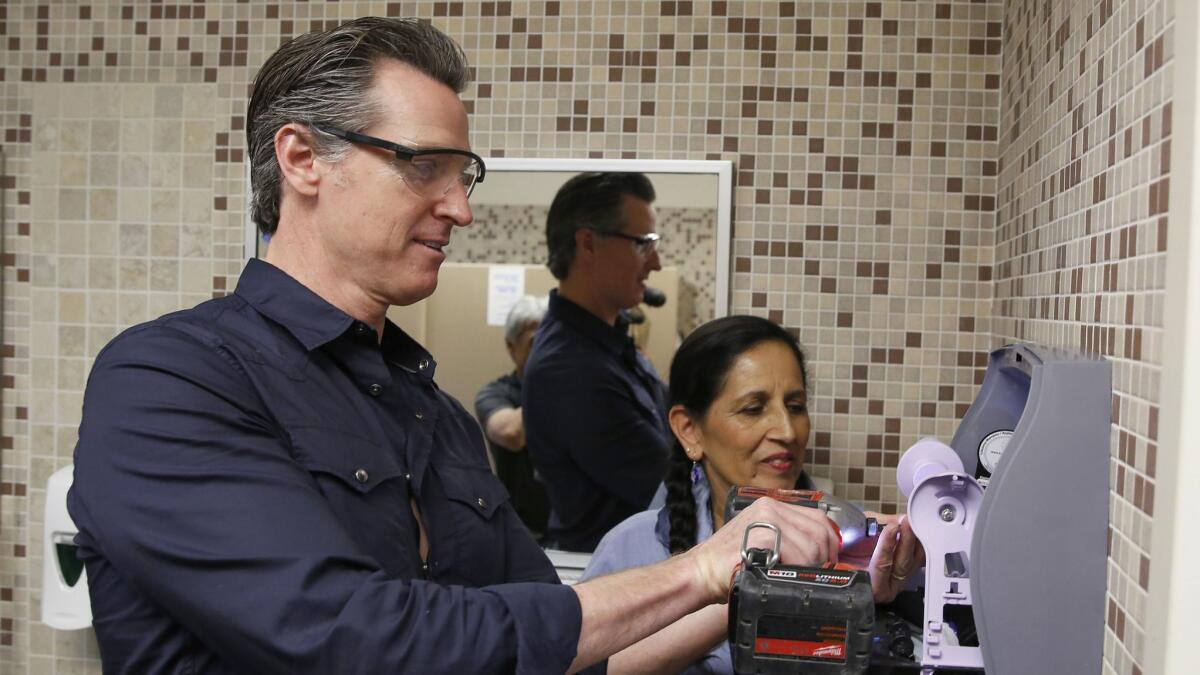Newsom says new California commission will address jobs threatened by automation

- Share via
Reporting from Sacramento — Gov. Gavin Newsom said Wednesday that California must take action to prepare for an inevitable wave of job losses due to the rapid rise of automation and advances in technology, an economic transformation that will affect millions of workers over the next decade.
The governor announced the creation of a new Future of Work Commission at American River College in Sacramento, where he worked briefly alongside a campus custodian and landscaper to commemorate workers on International Workers’ Day. The commission, Newsom said, would identify sectors of the state’s economy most vulnerable to automation and recommend tangible ways to assist and retrain Californians at risk for losing their livelihoods.
“We’re not just going to be bystanders as it relates to these macroeconomic changes. … We want to shape them, and we think California can help shape that future,” Newsom said. “I’m trying to meet this with a sense of urgency.”
The future of work and effects of automation were major themes of Newsom’s 2018 gubernatorial campaign. He warned that California could not afford to ignore the likelihood that the rise of automated vehicles would lead to truck and taxi drivers losing their jobs, along with thousands of warehouse and retail jobs potentially being eliminated by high-tech innovations.
Among the options to consider, Newsom said Wednesday, are portable benefits that would stay with workers who change professions, as well as tax credits for Californians to use on training for new employment skills.
The governor dismissed the assessment by some that technological advances were arriving too quickly to retool the workforce and that government-provided universal basic income in which a no-strings stipend would be paid to every adult in the state — a smaller-scale program is being piloted in Stockton — was the only solution.
“It’s not my default. I think that’s a worst-case, break-glass scenario,” Newsom said. “I think we are more than capable of addressing automation in a way that actually can frame abundance, as opposed to scarcity — meaning come out the other side with more jobs, more opportunities, not less. So I’m not willing to submit that [universal basic income] is where we need to end up.”
What would a universal basic income mean for America? Stockton thinks it has the answer »
The rapid increase in automation has created considerable anxiety among American workers. A 2017 Pew poll found that 72% of adults said they were worried about a future in which robots and computers perform human jobs.
Virtual assistants such as Siri or Alexa are being used in hotels, standing in for concierges or front desk assistants. Amazon has opened cashier-less convenience stores and self-serve kiosks have popped up inside McDonald’s restaurants.
Newsom said his commission will comprise 14 to 18 members and include representatives from the public and private sectors, labor, and leaders in education and workforce development. The panel will provide its recommendations to the governor in February.
Newsom signed the executive order creating the commission after a brief “work day” at the Sacramento community college where — with television news cameras watching — he changed the bulbs in a fluorescent light fixture, replaced a paper towel dispenser in a restroom and fixed a lawn sprinkler, among other tasks.
“I think it’s really important that we don’t walk by people who are cleaning the toilets, that we acknowledge them, we celebrate them,” Newsom said. “Those are the folks who are the backbone of the country.”
Custodian Maria Arambula, 53, thanked Newsom for spending the morning with her. She told the governor that, despite having a good job and good benefits, it’s still difficult to get by.
“We’re all just out there struggling,” said Arambula, a mother of three daughters who has worked at the college for 23 years. “It’s hard.”
Twitter: @philwillon
More to Read
Get the L.A. Times Politics newsletter
Deeply reported insights into legislation, politics and policy from Sacramento, Washington and beyond. In your inbox three times per week.
You may occasionally receive promotional content from the Los Angeles Times.











